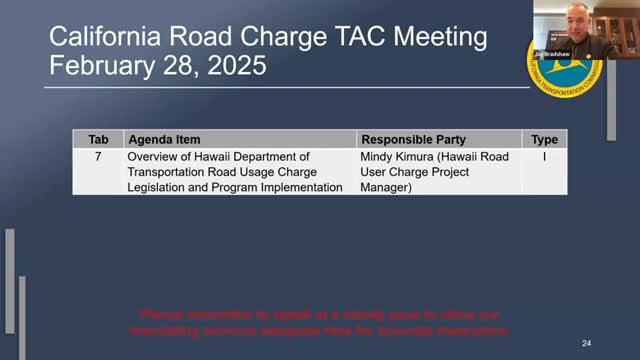Hawaii to begin optional per‑mile charges for electric vehicles July 1, 2025; mandatory per‑mile charging set for 2028
Get AI-powered insights, summaries, and transcripts
Subscribe
Summary
Mindy Kimura, program manager for the Hawaii Department of Transportation’s Road Usage Charge program, told the committee that Hawaii has passed legislation (Act 222 of 2023) to implement a road usage charge and will begin offering EV owners a choice between a per‑mile charge and a capped flat fee beginning July 1, 2025.
Mindy Kimura, program manager for the Hawaii Department of Transportation’s Road Usage Charge program, told the committee that Hawaii has passed legislation (Act 222 of 2023) to implement a road usage charge (RUC) and will begin offering EV owners a choice between a per‑mile charge and a capped flat fee beginning July 1, 2025.
The pilot‑to‑implementation path: Kimura said Hawaii used a federally funded demonstration project and a multi‑year public outreach campaign to test reporting methods and build legislative support. The state mailed roughly 360,000 individualized “driving reports,” ran a demonstration that compared odometer readings and technology‑based reporting (plug‑in and GPS devices), and included legislators and community leaders in a stakeholder advisory group.
Under the statute Kimura described, EV drivers will initially have two options starting July 1: pay a per‑mile rate set in the law at $8 per 1,000 miles (about 0.8¢ per mile), or pay a flat $50 annual road usage charge. Kimura said the $8 per‑1,000‑mile rate was set to approximate revenue neutrality with an average vehicle’s fuel taxes; the $50 cap will remain in place through July 1, 2028, after which EV owners will be required to use the per‑mile system.
Kimura said Hawaii chose to leverage existing processes (the state’s annual vehicle safety inspection program and county DMV registration systems) to minimize administrative costs and to use systems that already collect odometer readings. “We found [the annual inspection] to be the most favorable mileage reporting option among Hawaii residents,” she said.
The implementation plan involves extensive coordination across state and county agencies and multiple third‑party vendors. Kimura noted that Hawaii’s four county DMVs use different registration vendors and that the state has set up an implementation working group with weekly vendor check‑ins to align data transfers, registration notices, online and in‑person payment channels, and printer outputs for registration certificates.
Kimura described outreach and user‑facing tools the state has developed: county‑tailored communications, materials for DMV staff, and an online estimator that lets drivers see an estimate of their annual RUC under current law (including a view with and without the statutory cap in 2028). She said the state will maintain a communications push in advance of the July launch and continue working on a longer‑term transition plan to expand RUC coverage to all light‑duty vehicles by a later statutory deadline.
Committee members asked about privacy and data security given the number of vendors and systems involved. Kimura said Hawaii is leveraging existing DMV security and transfer protections and that privacy and security were part of the implementation consideration. The committee also commended Hawaii’s approach; several members said Hawaii’s work provides a model other states should watch.
Ending: Kimura said Hawaii will open enrollment and choice for EV owners with the July 1, 2025 registration cycle and will deliver a formal transition plan to the legislature as required by law. The department provided a public website with the estimator and background materials and offered to supply implementation lessons to neighboring jurisdictions.
